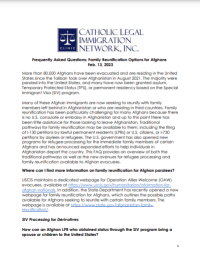Many Afghans paroled into the United States in 2021 and 2022 are seeking to reunify with family members left behind in Afghanistan or who are residing in third countries. This FAQ provides an overview of both the traditional immigration pathways as well as the new avenues for refugee processing and family reunification available to Afghan […]










